Understanding Kidney Stones: Causes, Symptoms, and Treatment
Kidney stones, also known as renal calculi, are solid crystalline structures that form within the urinary system of the kidney. They develop due to the crystallization of substances found in urine, leading to the aggregation of these crystals and the formation of stones within the kidneys.
Kidney stones come in various types, with the most common type in Singapore being calcium oxalate stones, accounting for approximately 70% of all cases. Other types include calcium phosphate, uric acid, struvite (infection-related), and cysteine stones. It’s worth noting that about 50% of patients who have had kidney stones may experience their recurrence within the next 10 years.
The causes of kidney stones are multifactorial, and various factors contribute to their formation. Some primary causes include:
Low Fluid Intake: Inadequate consumption of fluids or excessive fluid loss, such as through sweating, can result in concentrated urine, increasing the risk of stone formation. Those who consume less than 2 liters of fluids per day or work in hot environments are at higher risk.
Dietary Factors: A diet high in salt (sodium), oxalate-rich foods, and animal protein can lead to an increased concentration of stone-forming substances in the urine.
Medical Conditions: Certain medical conditions, including obesity, hypercalcemia, gout, recurrent urinary tract infections, and structural kidney abnormalities like pelviureteric junction obstruction, horseshoe kidney, and medullary sponge kidney, can also increase the likelihood of kidney stone formation.
Initially, when kidney stones form within the kidney, they often do not cause any symptoms. However, when the stones migrate to the ureter, they can lead to severe pain. This pain typically starts in the flank (the side of the upper abdomen) and can radiate down to the groin. Additionally, kidney stones can cause blood in the urine (hematuria) and contribute to urinary tract infections.
The treatment of kidney stones depends on various factors, including the size and location of the stone as well as the patient’s clinical condition and medical history. In the acute stage when the stone is causing intense pain, pain-relieving medications may be prescribed. Patients are also encouraged to drink plenty of water to facilitate the passage of the stone. Additionally, the urologist may recommend medications to aid in stone expulsion.
If the stone fails to pass or is unlikely to pass spontaneously, the urologist may suggest minimally invasive treatments to remove the stone. These treatments include:
- Extracorporeal Shockwave Lithotripsy (ESWL):
This procedure uses shockwaves generated from outside the body to break the stone into smaller pieces, thereby allowing the stones to pass out more easily.
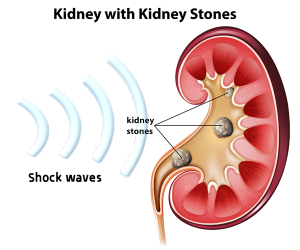
- Ureteroscopy (URS):
A thin tube with a camera (scope) is inserted into the urethra and passed through the bladder and the ureter to reach the stone, which can then be fragmented and removed.
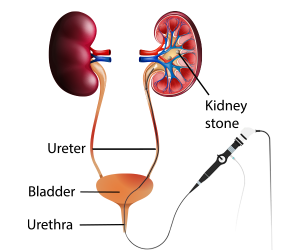
- Renoscopy or Retrograde Intra-renal Surgery (RIRS):
A flexible scope is inserted into the urethra to access the kidney and fragment the stone
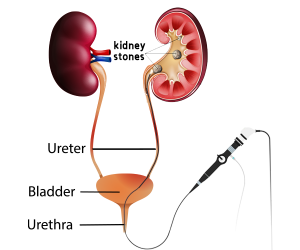
- Percutaneous Nephrolithotomy (PCNL):
This is a surgical procedure involving getting access to the kidney and stone through a small incision in the flank or lower back.
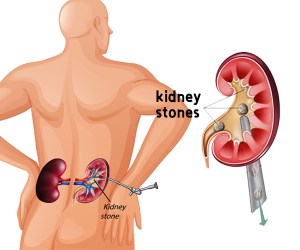
- Laparoscopic Surgery:
In some cases, laparoscopic or keyhole surgery may be required to remove the kidney stone and/or repair a structural abnormality of the kidney.
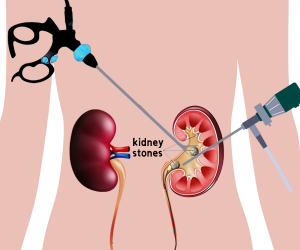
- ECIRS Surgery:
A minimally invasive procedure that combines retrograde ureteroscopy and percutaneous access, allowing simultaneous endoscopic treatment from both the ureter and kidney to effectively remove complex stones.
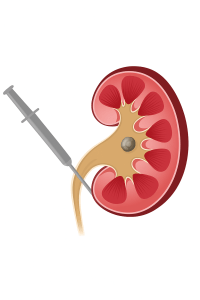
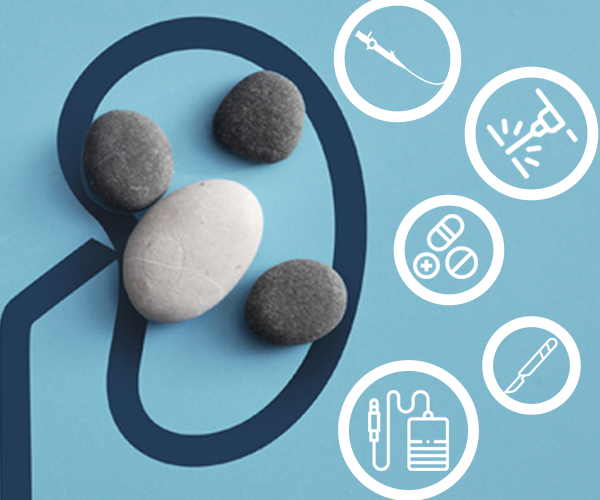
Choosing the Right Treatment
The choice of the most appropriate treatment depends on factors like the stone’s size, location, and individual patient characteristics. Dr. Azhari, with experience as senior consultant and director of endourology (kidney stone service) in SGH from 2016 to 2023, considers not only the stone’s characteristics but also the patient’s clinical condition, medical history, and anatomy to customize the treatment plan for an ideal outcomes.
As part of Dr. Azhari‘s comprehensive approach to kidney stone disease, metabolic evaluation and preventive strategies are integral components of the treatment process. This ensures patients receive holistic care to manage kidney stones effectively and prevent future occurrences. Get in touch with our kidney stone specialist in Singapore today.
Accredited Specialist
Dr Azhari, a distinguished urologist and kidney stone surgeon, possesses comprehensive expertise in addressing and managing a diverse array of urological conditions.
Comprehensive Services
Under the guidance of Dr Azhari, our clinic delivers an array of specialized urological services, ensuring precise diagnoses and effective treatments tailored to your specific needs.
Approachable Staff
Our dedicated team collaborates closely with each patient, focusing on understanding individual health objectives and customizing treatment plans accordingly.
Get an Accurate Diagnosis & Appropriate Treatment for Your Urological Conditions
Make An Appointment With Our Urologist Singapore, Dr Azhari Today.

Dr. Nor Azhari Bin Mohd Zam
Urologist & Kidney Stone Specialist Singapore
- Skilled urologist and kidney stone surgeon
- Director of Endourology (Urinary stone service) at Singapore General Hospital – 2016 to 2023
- Recognized with the College of Surgeons Gold Medal and Singapore Urological Association Book prize
- Minimally invasive treatment options available (non invasive and endoscopic/key-hole techniques)
With over 14 years of experience as a certified kidney stone specialist in Singapore, Dr Nor Azhari specializes in treating a wide range of bladder, kidney, and prostate conditions. He offers minimally invasive treatment options and provides same-day appointments for convenience.




